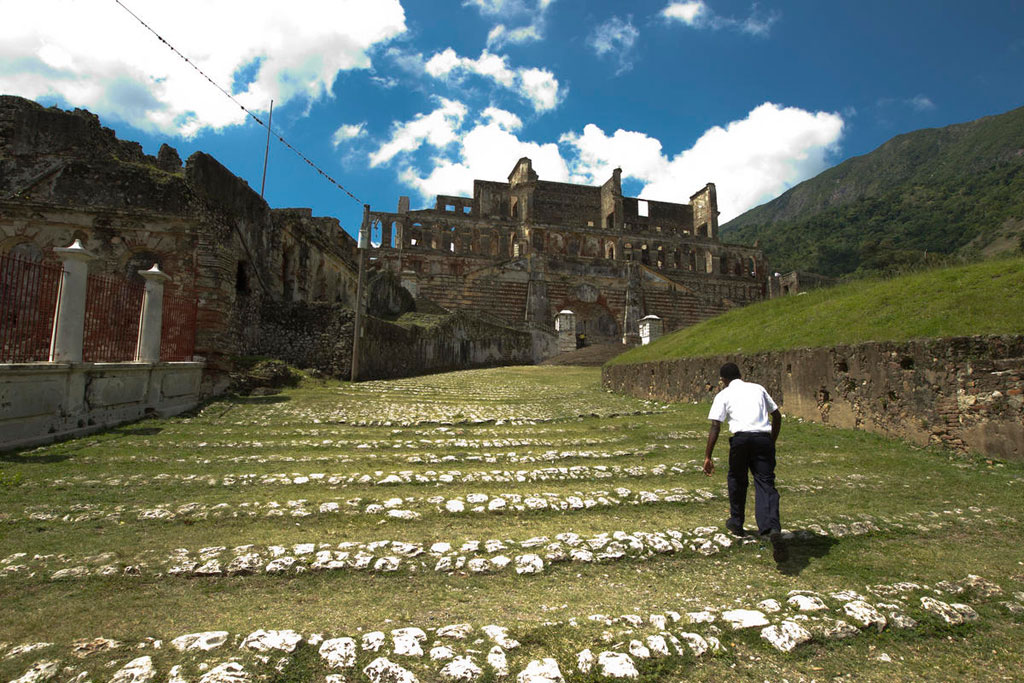Addressing General Assembly, UN officials spotlight vital role of culture in sustainable development

A man climbs up the steps of Sans-Souci Palace, a 200-year-old royal residence built by King Henri-Christophe of Haiti, near Cap-Haïtien. UN Photo/Victoria Hazou
5 May 2014 – Culture, in all its multifaceted dynamism, must be thoroughly integrated in the post-2015 development agenda, senior United Nations officials told the General Assembly today, highlighting the need to recognize the vital role that culture plays in combatting poverty and promoting sustainable growth.
As the UN continues its work helping to define the global development roadmap after 2015, the target date for achieving the anti-poverty Millennium Development Goals (MDGs), the 193-member Assembly met today at Headquarters in New York to debate the role of culture in that framework.
“I hope today’s debate will help distil your cultural experiences and practices into new and bold creative directions which can inspire the post-2015 development agenda and our work for a better world,” said Deputy-Secretary-General Jan Eliasson, recalling that, from the work of Dag Hammarskjöld some 60 years ago, to the efforts of its many Goodwill Ambassadors today, the UN has long championed culture as a means to promote development.
“Culture is not static. It is very dynamic. It evolves and reflects constantly. It gives new perspectives and new experiences” he continued, noting for example how the role of women has changed in various societies over the years and has had a deep cultural and societal impact,” a positive impact, I would say very strongly.”
“We should recognize the role of culture for all. We should protect it and allow it to flourish in all aspects of the sustainable development agenda and also to see it as a creative part of national identity,” said Mr. Eliasson.
Sharing that view, Acting Assembly President, Mohamed Khaled Khiari, sitting in for President John Ashe,said: “Culture is also the thread that binds together the social fabric of our societies, defining our sense of identity and belonging.”
Yet, development actors increasingly recognize that one size does not fit all, he said. “Understanding and considering a society’s cultural aspects is critical to adapting development approaches to local contexts and ensuring successful outcomes.”
Irina Bokova, Director-General of the UN Educational, Scientific and Cultural Organization (UNESCO), echoed this sentiment, telling participants that “this is where culture can help, to foster participation, to craft a more balanced and meaningful development model for the people, by the people”.
In parts of Africa, she noted the role of traditional leaders and doctors in gaining confidence of patients to strengthening health care, combating HIV and improving the quality of education.
In Jacmel, Haiti, Carnival represents thousands of local jobs in the craft and creative industries, she continued, adding that such sectors account for $624 million around the world.
There is also a link between nature and culture, as exemplified by the Galapagos Islands in Ecuador and other World Heritage sites, which also provide a source of identity, fulfilment and belonging for people.
In addition, cultural leaders and artists influence public opinions and behaviours, and “we will count on their voices to support and encourage the profound changes we are hoping to achieve” in the development world after 2015, Mr. Khiari said.
He announced that Mr. Ashe will host on 6 June a cultural event and concert with “a number of respected performing artists and celebrities from all corners of the world” who will “lend their voices, names and talent to raise awareness on the post-2015 agenda and our global commitment to eradicate poverty”.
For his part, Taleb Rifai, Secretary-General of the UN World Toursim Organization said “heritage tells mankind’s story; it tells our story. Tourism can enliven this heritage”. The nexus between tourism and culture thus offers an immense opportunity to contribute to inclusive economic growth, social development and stability and heritage preservation.
To that end, he said global tourism intensifies our role as global citizens, stewards of world heritage and ambassadors of peace – “calling us to preserve our past, so we can protect our future.”
The General Assembly adopted three resolutions on culture and development in 2010, 2011 and 2013.
Another example of the increasing awareness around culture’s role in development is its mention in UN documents. In 2006, culture was highlighted in less than 30 per cent of UN Development Assistance Frameworks, whereas now that figure has risen to more than 70 per cent, according to recent figures.
Today’s debate is taking place amidst the ongoing meeting of the Open Working Group on Sustainable Development, also being held in New York.




